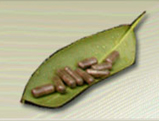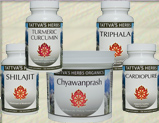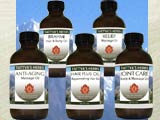 Loading... Please wait...
Loading... Please wait...Providing 25 Years Of Premium Service
Storewide Sale - Save 20%
Blog - Ayurvedic Herb info allergies
Allergies and Ayurveda: A simple guide to the herbs of sweet relief
Posted on 26th Mar 2015
Greetings, fellow Seasonal Allergy Sufferers. Now is the season when so many of us, from all walks of life, come together with our tissues and eye drops
 and cry; “mercy!” As you well know, the Ayurvedic approach to alleviating seasonal allergies is deep and wide, encompassing every aspect of health including; diet, activity, mind/body techniques, pranayama, and finally, herbal supplementation. Many explorations on these topics can be found with a quick google search, so for today, we will concern ourselves only with the last category; herbal supplementation.
and cry; “mercy!” As you well know, the Ayurvedic approach to alleviating seasonal allergies is deep and wide, encompassing every aspect of health including; diet, activity, mind/body techniques, pranayama, and finally, herbal supplementation. Many explorations on these topics can be found with a quick google search, so for today, we will concern ourselves only with the last category; herbal supplementation.
While any dosha imbalance can exhibit allergic symptoms, the most common spring allergies of runny nose, sneezing, itchy eyes, and sluggish energy characterizes a classic Kapha imbalance. Damp, heavy, cold, sluggish, and inflamed; the Kapha imbalance profile perfectly mirrors our unfortunate present condition. To create movement, discharge toxins and cool the cascade of inflammation are the primary goals of an herbal approach to relief.
In Ayurveda, supporting digestive fire, or agni, is the cornerstone of all healing, and the lack of this fire, the foundation of all disease. The corresponding and integral re-action to strong agni, is the efficient removal of toxins, or ama. This dual approach to healing makes no exception for relieving seasonal allergies. The following herbal offerings, all work to increase agni and thus encourage removal of ama, creating dynamic movement in the Kapha stalemate of seasonal allergies. Generally, we recommend one capsule, two times a day, but dosage of these tonic herbs can be gradually increased during acute situations. For long-term dosage adjustments, we recommend consulting your Health Care Professional.
Turmeric Curcumin and Ginger, two members of the Zingiberaceae family, increase digestive ami and reduce infla mmation of the mucus membranes in the respiratory system. These aromatic, pungent and spicy roots inspire the digestive system to optimal operation. Traditional ginger and lemon tea, with the addition of Turmeric can be a nice alternative to swallowing pills. Our capsules can be opened and poured out into hot water, with lemon and honey, for a daily agni- increasing tea. I recommend a non-dairy milk in times of excess mucus production, as unfermented dairy can further stagnate the Kapha imbalance.
mmation of the mucus membranes in the respiratory system. These aromatic, pungent and spicy roots inspire the digestive system to optimal operation. Traditional ginger and lemon tea, with the addition of Turmeric can be a nice alternative to swallowing pills. Our capsules can be opened and poured out into hot water, with lemon and honey, for a daily agni- increasing tea. I recommend a non-dairy milk in times of excess mucus production, as unfermented dairy can further stagnate the Kapha imbalance.
Amla, while exhibiting the most concentrated amount of vitamin C found in the vegetable kingdom at more than 3000 mgs per fruit, supports a healthy inflammation response, the elimination of toxins, and strong regulation of nutrient absorption.
Triphala adds to the power of Amla (Amalaki), both Bibhitaki and Haritaki. Bibhitaki promotes healthy mucus production, and haritaki tones the mucus membrane of the intestinal wall. This potent yet gentle Trio, considered in India as the greatest and most versatile of all herbal formulations, works synergistically to promote internal cleansing of stagnate and excessive conditions, and aids in strong digestion and assimilation of food.
Chyawanprash also wields the steady power of Amla, as the first fruit in a list of nearly 50 rejuvenative herbs in a sweet jam of ghee and honey. Considered rasayana, a Sanskrit word describing an elixir of life, Chyawanprash decreases both Kapha and Vata, while increasing Pitta. This ancient rasayana treat balances the immune system, strengthens the respiratory system and supports healthy cleansing and elimination of toxins.
An important addition to the agni-increasing family of herbs is Ashwagandha. Ashwagandha is most well-known for its adaptogenic support of the adrenal glands, so easily depleted by our busy lives and poor nutrition, and at this task, it does excel. However, of equal and less proclaimed value, is Ashwagandha’s unique ability to modulates, or balance, the immune system. This action cannot be underestimated in the case of allergic reactions, which send this life saving system into inflammatory hyperdrive.
For a well-rounded herbal approach to seasonal suffering; Turmeric Curcumin, Ginger, Amla, Triphala, Chyawanprash, Ashwagandha and of course, don’t forget your Neti Pot!















